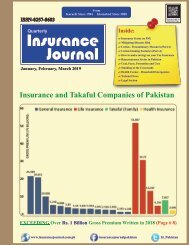Insurance Journal (2nd Quarter 2019)
Create successful ePaper yourself
Turn your PDF publications into a flip-book with our unique Google optimized e-Paper software.
Guest Contribution<br />
Ÿ<br />
company only if the company<br />
continues to buy from them, which<br />
in turn depends on the financial<br />
performance of the company.<br />
Again, a weak company may not<br />
be able to pay the suppliers in time,<br />
adding to their cash flow<br />
problems. Clients on the other<br />
hand can be assured of getting<br />
their supplies from the company<br />
only if it continues to operate<br />
profitably. A financially weak<br />
company may fail to offer<br />
adequate credit or carry sufficient<br />
stock. Hence, both suppliers and<br />
clients of a company have an<br />
interest in the well being of the<br />
company.<br />
The Society includes public at<br />
large as well as the government. A<br />
society can benefit from a<br />
company only if the company has<br />
a capacity (meaning profitability)<br />
to participate in socially desirable<br />
activities. A government can<br />
collect more taxes from a<br />
Ÿ<br />
Ÿ<br />
Ÿ<br />
Ÿ<br />
worth of the company,<br />
Lenders require security of their<br />
investment and assurance of<br />
timely interest payments,<br />
Employees want continued<br />
employment at attractive terms,<br />
B u s i n e s s a s s o c i a t e s s e e k<br />
opportunities to further their own<br />
profits while the<br />
Society looks up to the company to<br />
be a good citizen and play its role<br />
in improvement of its community<br />
and environment.<br />
Quite understandably, the interests of<br />
these stakeholders often clash with<br />
each other. For example, the interest<br />
of owners is often best served by<br />
depriving the other stakeholders of<br />
their rightful dues. Inadequate<br />
salaries to employees, lower prices to<br />
suppliers, higher charges to clients,<br />
tax avoidance, disregard of social<br />
their personal goals, the failure of<br />
s u c h p r o j e c t m a y e r o d e t h e<br />
sustainability of the company.<br />
Similarly, if the government of a<br />
c o u n t r y ( o n e o f t h e m a j o r<br />
stakeholders in any company) levies a<br />
very high rate of tax on the operations<br />
or goods of a company, this may<br />
reduce the company's profits and also<br />
its ability to pay proper salaries to its<br />
workers, or a proper return to its<br />
investors.<br />
Decisions made by a company affect<br />
all the stakeholders; yet only a few of<br />
them have an influence on the<br />
company's decision-making process.<br />
Another potent way of classifying<br />
stakeholders is on the basis of how<br />
much opportunity they have to protect<br />
their respective interests through an<br />
influence on company's decisions. On<br />
this basis, stakeholders either have<br />
full opportunity, a limited opportunity<br />
or relatively no opportunity to protect<br />
their interests. Now if we try to list the<br />
stakeholders, using both of the above<br />
profitable company.<br />
Conflicting or Diverse Interests of<br />
Stakeholders<br />
Every class of stakeholders has its<br />
o w n p a r t i c u l a r i n t e r e s t s a s<br />
enumerated below:<br />
Ÿ<br />
The interest of the owners lies in<br />
sustainable growth in the net<br />
obligations, all produce higher profits<br />
for the company; in turn leading to<br />
higher dividends and higher share<br />
value for the shareholders.<br />
And then, there is the overall interest<br />
of the company which we refer to as<br />
the collective interest of all the<br />
stakeholders, namely the continued<br />
profitable existence of the company.<br />
If the managers of the company opt to<br />
invest in risky projects just to satisfy<br />
bases of classification in one table, it<br />
would appear as shown in Fig 1<br />
below.<br />
Need for a Mechanism to Balance<br />
Stakeholders' Interests<br />
Those stakeholders (like controlling<br />
shareholders, larger institutional<br />
lenders, executive directors, etc.) who<br />
have greater influence on the<br />
<strong>Insurance</strong> <strong>Journal</strong> April, May, June <strong>2019</strong><br />
19<br />
Find us at: www.insurancejournal.com.pk — www.facebook.com/insurancejournalpakistan

















